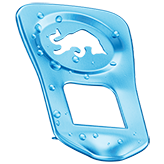

One of caffeine’s primary actions in the human body is its stimulating effect on cognitive functions. Each 250 ml can of Red Bull Sugarfree contains 80 mg of caffeine.
Taurine is an amino acid, naturally occurring in the human body and present in the daily diet. Taurine, one of the most abundant amino acids in the brain, heart, and muscles, is involved in a wide range of biological processes.
Vitamins are essential micronutrients that are required for maintaining normal body functions. There are two types of vitamins: fat-soluble and water-soluble. Red Bull Sugarfree contains water-soluble vitamins. Water-soluble vitamins do not get stored as much as fat-soluble vitamins in the body. Instead, they circulate in the blood, and whatever the body does not use is excreted. Red Bull Sugarfree contains the water-soluble B-group vitamins niacin (vitamin B3), pantothenic acid (vitamin B5), vitamin B6 and vitamin B12.
Acesulfame K and Sucralose are among the most tested and most used sugar substitutes worldwide.
Acesulfame K is a non-caloric sweetener. It is used worldwide in over a thousand different products including foods and drinks like chewing gums, dairy products, baked goods, etc..
Sucralose is a non-caloric sweetener made from sugar and it tastes like sugar. It is produced synthetically and is used in a wide variety of products, including beverages, baked goods, desserts, dairy products, canned fruits and syrups.
Acesulfame K and Sucralose are among the most-tested and most-used sugar substitutes worldwide. Both have an excellent safety profile. Numerous scientific studies demonstrate that these substances are safe for use as sweetening ingredients.
The safety of these sweeteners has been evaluated by regulatory bodies all over the world (e.g. FDA in the US). Health Authorities rely on the safety evaluations of independent scientific advisory bodies such as the European Food Safety Authority (EFSA), the United States Food and Drug Administration (FDA), and the Joint FAO/WHO Expert Committee on Food Additives (JECFA).
Water is a main ingredient of Red Bull Sugarfree. Dedication to its quality contributes to the iconic taste in every sip.





